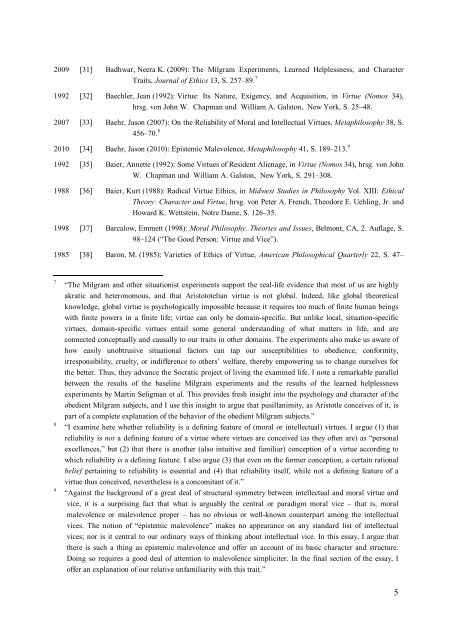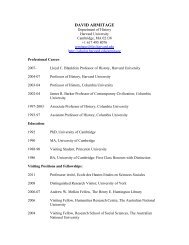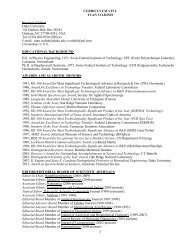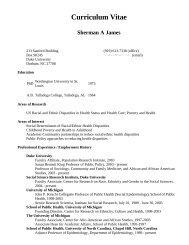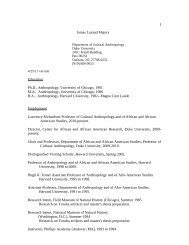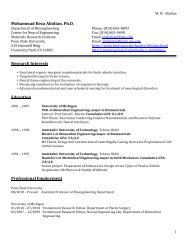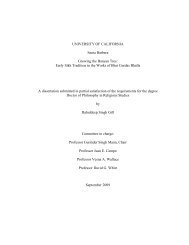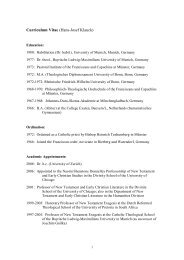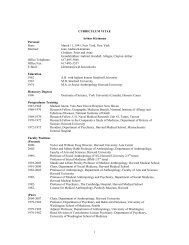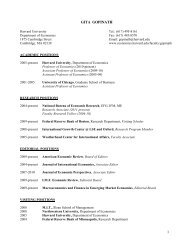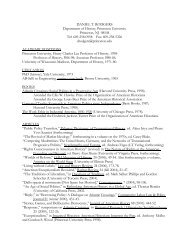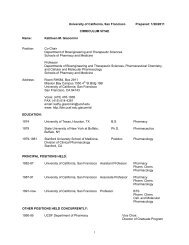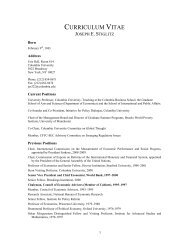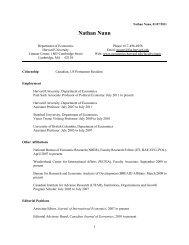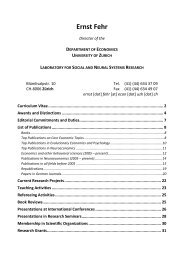nati<strong>on</strong>al Journal of Management Reviews 10, S. 221–43. 52005 [22] Arpaly, Nomy (2005): Comments <strong>on</strong> Lack of Character by John Doris, Philosophy and PhenomenologicalResearch 71, S. 643–47. – Vgl. dazu: [120].2000 [23] Athanassoulis, Nafsika (2000): A Resp<strong>on</strong>se to Harman: <strong>Virtue</strong> Ethics and Character Traits, Proceedingsof the Aristotelian Society 100, S. 215–21. – Zu [171]. Vgl. dazu [172].1995 [24] Audi, Robert (1995): Acting from <strong>Virtue</strong>, Mind 104, S. 449–71. Wiederabgedruckt in Audi,Moral Knowledge and Ethical Character, New York, Oxford, S. 174–92.1988 [25] Audi, Robert (1998): A Liberal Theory of Civic <strong>Virtue</strong>, in <strong>Virtue</strong> and Vice, hrsg. v<strong>on</strong> EllenFrankel Paul, Fred D. Miller, Jr. und Jeffrey Paul, Cambridge, S. 149–70.2009 [26] Audi, Robert (2009): Moral <strong>Virtue</strong> and Reas<strong>on</strong>s for Acti<strong>on</strong>, Philosophical Issues 19, S. 1–20.2010 [27] Axtell, Guy (2010): Agency Ascripti<strong>on</strong>s in Ethics and Epistemology: Or, NavigatingIntersecti<strong>on</strong>s, Narrow and Broad, Metaphilosophy 41, S. 73–94. 62000 [28] Bächli, Andreas/Graeser, Andreas (2000): Tugend, in dies., Grundbegriffe der antiken Philosophie.Ein Lexik<strong>on</strong>, Stuttgart, S. 216–21.1996 [29] Badhwar, Neera K. (1996): The Limited Unity of <strong>Virtue</strong>, Nous 30, S. 306–29.1997 [30] Badhwar, Neera K. (1997): Self-Interest and <strong>Virtue</strong>, Social Philosophy and Policy 14, S. 226–63.56“For the past four decades, debate has occurred in respect of situati<strong>on</strong>al social psychology and virtue ethics.This paper attempts to rec<strong>on</strong>cile this debate. Situati<strong>on</strong>ists propose a fragmentati<strong>on</strong> theory of character (eachpers<strong>on</strong> has a whole range of dispositi<strong>on</strong>s, each of which has a restricted situati<strong>on</strong>al applicati<strong>on</strong>) and do notsubscribe to a regularity theory of character (behaviour is regulated by l<strong>on</strong>g-term dispositi<strong>on</strong>s). In order tosupport this view, they cite a number of experiments. It is proposed that the substantive claims made bysituati<strong>on</strong>ist social psychologists, for the most part, do not undermine or disagree with an Aristotelian virtueethics perspective, but stem from a misunderstanding of c<strong>on</strong>cepts of moral character, faulty c<strong>on</strong>clusi<strong>on</strong>s andgeneralizati<strong>on</strong>s in respect of experimental results. Situati<strong>on</strong>ists take a narrow view of character andmorality. Evidence from organizati<strong>on</strong>al behaviour and managerial research literature supports the view thatboth situati<strong>on</strong>al (organizati<strong>on</strong>al) features and inner characteristics (including virtues) are powerfulinfluences and determinants of morally upright and morally deviant behaviour. The role of practicaljudgement in bridging these views is discussed. As a way forward in rec<strong>on</strong>ciling situati<strong>on</strong>al socialpsychology with virtue ethics, the paper proposes an Aristotelian–Thomistic framework to overcome someof the problems associated with inadequate regulative ideals in building a normative moral theory.”“In this article, the logic and functi<strong>on</strong>s of character-trait ascripti<strong>on</strong>s in ethics and epistemology is compared,and two major problems, the “generality problem” for virtue epistemologies and the “global trait problem”for virtue ethics, are shown to be far more similar in structure than is comm<strong>on</strong>ly acknowledged. Bey<strong>on</strong>d theaporia of character-trait ascripti<strong>on</strong> and between the Scylla and Charybdis that virtue theories are faced within each field of philosophy, we find our passage by making full and explicit use of the “narrow-broadspectrum of trait ascripti<strong>on</strong>,” and by accounting for the various uses of it in an inquiry-pragmatist account.In virtue theories informed by inquiry pragmatism, the agential habits and abilities deemed salient inexplanati<strong>on</strong>s/evaluati<strong>on</strong>s of agents in particular cases, and the determinati<strong>on</strong> of the relevant domains andc<strong>on</strong>diti<strong>on</strong>s that an agent’s habit or ability is reliably efficacious in, is determined by pragmatic c<strong>on</strong>cernsrelated to our evaluative epistemic practices.”4
2009 [31] Badhwar, Neera K. (2009): The Milgram Experiments, Learned Helplessness, and CharacterTraits, Journal of Ethics 13, S. 257–89. 71992 [32] Baechler, Jean (1992): <strong>Virtue</strong>: Its Nature, Exigency, and Acquisiti<strong>on</strong>, in <strong>Virtue</strong> (Nomos 34),hrsg. v<strong>on</strong> John W. Chapman und William A. Galst<strong>on</strong>, New York, S. 25–48.2007 [33] Baehr, Jas<strong>on</strong> (2007): On the Reliability of Moral and Intellectual <strong>Virtue</strong>s, Metaphilosophy 38, S.456–70. 82010 [34] Baehr, Jas<strong>on</strong> (2010): Epistemic Malevolence, Metaphilosophy 41, S. 189–213. 91992 [35] Baier, Annette (1992): Some <strong>Virtue</strong>s of Resident Alienage, in <strong>Virtue</strong> (Nomos 34), hrsg. v<strong>on</strong> JohnW. Chapman und William A. Galst<strong>on</strong>, New York, S. 291–308.1988 [36] Baier, Kurt (1988): Radical <strong>Virtue</strong> Ethics, in Midwest Studies in Philosophy Vol. XIII: EthicalTheory: Character and <strong>Virtue</strong>, hrsg. v<strong>on</strong> Peter A. French, Theodore E. Uehling, Jr. undHoward K. Wettstein, Notre Dame, S. 126–35.1998 [37] Barcalow, Emmett (1998): Moral Philosophy. Theories and Issues, Belm<strong>on</strong>t, CA, 2. Auflage, S.98–124 (“The Good Pers<strong>on</strong>: <strong>Virtue</strong> and Vice”).1985 [38] Bar<strong>on</strong>, M. (1985): Varieties of Ethics of <strong>Virtue</strong>, American Philosophical Quarterly 22, S. 47–789“The Milgram and other situati<strong>on</strong>ist experiments support the real-life evidence that most of us are highlyakratic and heter<strong>on</strong>omous, and that Aristototelian virtue is not global. Indeed, like global theoreticalknowledge, global virtue is psychologically impossible because it requires too much of finite human beingswith finite powers in a finite life; virtue can <strong>on</strong>ly be domain-specific. But unlike local, situati<strong>on</strong>-specificvirtues, domain-specific virtues entail some general understanding of what matters in life, and arec<strong>on</strong>nected c<strong>on</strong>ceptually and causally to our traits in other domains. The experiments also make us aware ofhow easily unobtrusive situati<strong>on</strong>al factors can tap our susceptibilities to obedience, c<strong>on</strong>formity,irresp<strong>on</strong>sibility, cruelty, or indifference to others’ welfare, thereby empowering us to change ourselves forthe better. Thus, they advance the Socratic project of living the examined life. I note a remarkable parallelbetween the results of the baseline Milgram experiments and the results of the learned helplessnessexperiments by Martin Seligman et al. This provides fresh insight into the psychology and character of theobedient Milgram subjects, and I use this insight to argue that pusillanimity, as Aristotle c<strong>on</strong>ceives of it, ispart of a complete explanati<strong>on</strong> of the behavior of the obedient Milgram subjects.”“I examine here whether reliability is a defining feature of (moral or intellectual) virtues. I argue (1) thatreliability is not a defining feature of a virtue where virtues are c<strong>on</strong>ceived (as they often are) as “pers<strong>on</strong>alexcellences,” but (2) that there is another (also intuitive and familiar) c<strong>on</strong>cepti<strong>on</strong> of a virtue according towhich reliability is a defining feature. I also argue (3) that even <strong>on</strong> the former c<strong>on</strong>cepti<strong>on</strong>, a certain rati<strong>on</strong>albelief pertaining to reliability is essential and (4) that reliability itself, while not a defining feature of avirtue thus c<strong>on</strong>ceived, nevertheless is a c<strong>on</strong>comitant of it.”“Against the background of a great deal of structural symmetry between intellectual and moral virtue andvice, it is a surprising fact that what is arguably the central or paradigm moral vice – that is, moralmalevolence or malevolence proper – has no obvious or well-known counterpart am<strong>on</strong>g the intellectualvices. The noti<strong>on</strong> of “epistemic malevolence” makes no appearance <strong>on</strong> any standard list of intellectualvices; nor is it central to our ordinary ways of thinking about intellectual vice. In this essay, I argue thatthere is such a thing as epistemic malevolence and offer an account of its basic character and structure.Doing so requires a good deal of attenti<strong>on</strong> to malevolence simpliciter. In the final secti<strong>on</strong> of the essay, Ioffer an explanati<strong>on</strong> of our relative unfamiliarity with this trait.”5
- Page 1: Literatur
- Page 6: 53.2010 [39] Battaly, Heather (2010
- Page 9 and 10: 2005 [60] Brady, Michael S. (2005):
- Page 11 and 12: 2008 [72] Calhoun, Cheshire (2008):
- Page 13 and 14: 1998 [93] Cooper, John M. (1998): T
- Page 15 and 16: 2005 [120] Doris, John M. (2005): R
- Page 17 and 18: 1978 [138] Foot, Philippa (1978): V
- Page 19 and 20: 1996 [166] Griffin, James (1996): V
- Page 21 and 22: 166-84.1996 [188] Hooker, Brad (199
- Page 23 and 24: Theory and Moral Practice 8, S. 387
- Page 25 and 26: Ethics, hrsg. von Patricia H. Werha
- Page 27 and 28: Deutsche Zeitschrift für Philosoph
- Page 29 and 30: 2009 [280] Miller, Christian (2009)
- Page 31 and 32: 2000 [299] Oderberg, David S. (2000
- Page 33 and 34: Moral Education 24, S. 175-184.1997
- Page 35 and 36: Southern Journal of Philosophy 14,
- Page 37 and 38: 1997 [379] Slote, Michael (1997): V
- Page 39 and 40: 2009 [401] Sreenivasan, Gopal (2009
- Page 41 and 42: 2010 [416] Stohr, Karen E. (2010):
- Page 43 and 44: 2008 [441] Tessman, Lisa (2008): Re
- Page 45 and 46: 2009 [457] van Zyl, Liezl (2009): A
- Page 47 and 48: 2006 [475] Webber, Jonathan (2006):
- Page 49 and 50: 2008 [484] White, Richard (2008): R


